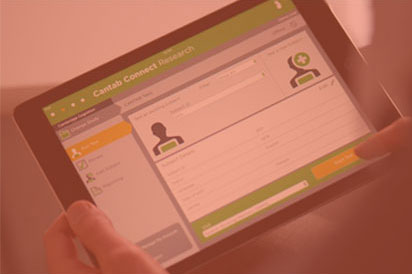Cambridge Cognition Holdings plc (LON:COG), which develops and markets digital technology to deliver customer-focused solutions to assess brain health, announced today its unaudited preliminary results for the year ended 31 December 2020.
Highlights
The Company delivered a strong performance in 2020, delivering on its growth strategy through focusing on commercialising its existing product range while continuing to invest in next generation products. Sales order intake totalled £12.7m, up 158% on the previous year.
Revenue increased 34% which, coupled with careful cost control, delivered a much-reduced loss for the year and a profitable fourth quarter. The contracted order backlog at the end of the year was £11.2m, up 96% on the prior year, and indicates the potential for further revenue growth in 2021.
At 31 December 2020 the Company had over £3m of cash, resulting from the increased order flow, reduced spending, and the successful equity placing of £1.4m, before costs, in March 2020.
Financial summary
· Record sales order intake of £12.7m (2019: £4.9m)
· Revenue up 34% to £6.7m (2019: £5.0m)
· Gross profit up 39% to £5.4m (2019: £3.9m)
· Loss for the year £0.4m, a £2.5m improvement (2019: £2.9m loss)
· Loss per share 1.5 pence (2019: 12.4 pence loss per share)
· Cash balance at 31 December 2020 £3.0m (31 December 2019: £0.9m)
Operational highlights
· Contracted order backlog at 31 December 2020 of £11.2m (31 December 2019: £5.7m)
· Increased commercial focus resulted in increases in sales order volumes, average prices and multi-product sales
· Growth in sales orders across the entire product portfolio: CANTAB™, electronic Clinical Outcomes Assessment (“eCOA”), and Digital Health solutions
· Excellent progress with NeuroVocalix™ in customer-funded proof-of-concept contracts
Commenting on the results Matthew Stork, Cambridge Cognition Chief Executive Officer, said:
“2020 was an excellent year for Cambridge Cognition. We saw strong growth in sales orders, driven by improved commercial execution, continued investment in drug discovery in Central Nervous System disorders and several unusually large orders. The business operated smoothly throughout the year despite the COVID-19 pandemic and any contract delays caused by the pandemic were compensated for by winning new contracts. We expect the business to continue to grow strongly through 2021 and beyond.”
CHIEF EXECUTIVE’S REVIEW
Overview
The Company had a successful year in 2020 delivering considerable sales growth of its digital technology solutions with a record £12.7m of sales orders secured, representing a 158% increase on 2019. This was a result of the implementation of the strategy developed in 2019 to increase focus on commercial activities, while continuing product development and creating operational resilience and flexibility. The COVID-19 pandemic accelerated market interest in virtual clinical trials, creating more opportunities for the Company in 2020 and beyond.
The 31 December 2020 contracted order backlog, which represents contracts not as yet completed where revenue is yet to be recognised, stood at £11.2m, almost double the figure from 2019. We anticipate that over £6.0m of the year-end contracted order backlog will be recognised in 2021, which will provide a solid platform for revenue growth in 2021.
The strong sales order intake helped to generate 34% revenue growth, bringing revenues for the year to £6.7m, and, with careful cost control, a considerably reduced loss of £0.4m and a net cash inflow from operating activities of £1.0m. With steady revenue growth and continued cost management over the year, the Company was profitable in the fourth quarter.
We continued to build the breadth of our digital technology product portfolio, targeted at major pharmaceutical and well-funded biotechnology companies. Key developments included new outcomes instruments and application modules for both our electronic Clinical Outcomes Assessment (“eCOA”) and Digital Health solutions. Progress on our voice-based platform, NeuroVocalix™, also continued apace.
The COVID-19 pandemic initially slowed the conversion of contracted orders into recognised revenue. After an adjustment period, the trials that were delayed by the pandemic resumed as contingency measures were put in place at clinical trial sites. Overall, the shortfall in our forecasted revenue was covered by growth in new contracts, some in part due to more spending on virtual clinical trials prompted by the pandemic.
We were grateful for the support of investors in our fundraise in the first quarter of 2020, conducted before COVID-19 was declared as a pandemic. The funds were used to invest in commercialising our solutions, to further develop our new voice solution, and to strengthen our balance sheet.
Overall, after a strong performance in 2020 and with a broader portfolio and a growing market, we are excited about the potential for further growth in 2021.
Financial Results
Record sales orders of £12.7m, a 158% year-on-year increase (2019: £4.9m), arose from increases in both contract volumes and average prices. This reflects the Company’s continuing focus on improving commercial execution, with more cross selling between product areas due, in part, to the expanded product portfolio. The Company won seven large orders of over £0.5m each, exceeding previous years. It should be noted that the 2020 performance was accentuated by two large one-off orders that, together, totalled £3.1 million. Such large single orders are outside of the scope of normal business and may not be repeated every year.
Revenue grew by 34% to £6.7m (2019: £5.0m). Revenue is recognised over the term of the contracts and so the £6.7m revenue recognised in 2020 was from contracts won both in 2020 and in prior years:
· £2.6m from the £5.7m contracted order backlog at the end of 2019, and
· £4.1m from the £12.7m orders contracted during 2020.
We anticipate the £11.2m contracted order backlog at the end of December 2020 will generate at least £6.0m of revenue to be recognised in 2021 with the to balance be recognised in subsequent years.
Recognised revenue split by type was as follows:
| 2020£m | 2019£m | Increase£m | Increase | |
| Software | 2.7 | 2.5 | 0.2 | 9% |
| Services | 3.7 | 2.3 | 1.4 | 57% |
| Total Software & Services | 6.4 | 4.8 | 1.6 | 32% |
| Hardware | 0.3 | 0.2 | 0.1 | 76% |
| Total Revenue | 6.7 | 5.0 | 1.7 | 34% |
Service revenue grew by 57% as more implementation and bespoke development work was carried out. Software revenue grew by a more modest 9% but, given the time lag between contract signature and software usage, we would expect this to grow further in 2021.
Hardware sales were a small proportion of revenue in 2020; the hardware, which is procured from third parties, is only supplied by Cambridge Cognition when specifically requested by a customer to support a project. Hardware sales had been expected to decline as digital devices become ubiquitous, however, we now integrate wearable devices into our solution and so increased the supply of these in 2020.
Gross profit was £5.4m (80.4% margin) compared with £3.9m (77.2% margin) in 2019. The margin growth was due to a reduction in third party costs.
Administrative expenses decreased by 13% to £6.1m (2019: £7.0m) as a result of two factors:
· Prior to the pandemic the Company planned and executed a reduction in operating costs as part of its strategy to reshape the cost base for its future growth. Subsequently, at the start of the pandemic, replacement and planned new hires were deferred until certainty returned to the market (£0.6m year-on-year decrease); and
· The COVID-19 pandemic meant that key cost areas such as exhibitions, conferences and travel were greatly reduced (£0.3m year-on-year decrease).
As planned, investment in R&D, which is necessary to maintain the company’s position at the forefront of the sector, was more targeted in 2020 and this resulted in R&D spend of £1.5m. As a proportion of revenue, this represents a reduction from 34% in 2019 to 22% in 2020.
The loss before tax was £0.6m (2019: £3.1m). R&D tax credits were £0.2m (2019: £0.2m). The post-tax loss for the year was £0.4m (2019: £2.9m), which equates to a loss per share of 1.5 pence (2019: 12.4 pence loss per share).
Cash inflow from operating activities was £1.0m (2019: £2.3m outflow), driven by the high value of sales orders. Sales contracts for clinical trials typically include an amount of cash billable upon signing, and as such an invoice is raised (and cash subsequently collected) as contracts are executed and before revenue is recognised.
After accounting for the £1.3m net received from the equity placing in Q1 2020, total cash inflow was £2.1m, and the year-end cash balance was just over £3.0m, which provides a solid platform for growth.
Business Strategy
A full strategic review was performed in 2019. The potential to accelerate the growth of the business was evident and plans were implemented to take advantage of the opportunities. The aim of the strategy is to increase market share in two fast growth markets and to build a substantial, profitable, specialist digital technology business.
The primary target market is the eCOA market, which is a US$1.2bn+ market, growing at approximately 15% per annum. 15% of clinical trials are conducted on Central Nervous System (“CNS”) disorders, which is the Company’s core area of expertise, and pharmaceutical companies continue to invest heavily in CNS drug development.
The second target market is the Digital Health solutions market for CNS disorders, which is a US$0.5bn market and is growing at 20% per annum.
The strategy, outlined in the annual report last year, comprises five strategic pillars. Progress in the year was as follows:
1. Build a diversified product mix based on four product categories: CANTAB™, eCOA, Digital Health solutions, and NeuroVocalix™. The business made good progress with major growth in all our production solutions. The development of our NeuroVocalix™ voice platform continued to progress well and has attracted interest from major pharmaceutical companies.
2. Focus on commercialising products. Record sales order intake, delivered through increased conversion of opportunities and increased upselling (especially through multi-product sales), has been a major success.
3. Build smoother revenues. A deeper contracted order backlog will naturally begin to smooth revenues. At the same time our strategy is to target longer-term contracts and long-term licence deals. We have progressed some exciting opportunities in this area.
4. Build partnerships to access wider opportunities and geographies. We have continued to explore partnership opportunities in Digital Health solutions and Healthcare in large territories (for example China and India) where direct selling is not an efficient route to market, with several large Clinical Research Organisations and a number of major blue chip tech companies. These are long-term endeavours. The impact has therefore not yet been factored into our forecasts.
5. Reduce investment in non-strategic activities. R&D spend was more targeted than in previous years. We have continued to progress the spin-out of our digital phenotyping business, which is nearly wholly grant-funded at this time.
Operational Review
Improving commercial execution is an ongoing strategic and operational goal. The considerable progress made in 2019 has reaped rewards and the Company continued that focus and progress in 2020.
We built further on the capability and coverage of our sales team. We hired a new Chief Commercial Officer and expanded the sales team in the USA later in the year. We ran a focused marketing programme, which, at the start of the pandemic, was adapted to be delivered completely online. Consequently we generated considerably more leads than in 2019.
The volume of orders contracted in the year increased considerably due to this commercial focus and the broader portfolio of solutions offered. In addition, cross-selling was successful with a 52% increase in the number of clinical trial customers ordering more than one product. As our product development continues and a broader sales pipeline is established, we will continue to build long-term resilience and growth within the business.
We are excited to see our newer products mature and attract more market interest. In parallel, it is pleasing to report that our established CANTAB™ product is going from strength to strength. We were delighted to announce our participation in three late phase schizophrenia trials in September. This is an important disease area in the neurological space and our involvement is a great credit to our scientific expertise. Our work on these trials will deliver revenue of more than £2m over the life of the contracts.
In the eCOA area, we commercialised the major upgrade we launched in late 2019 and considerably expanded our portfolio of eCOA instruments. We delivered on the strategy to upsell CANTAB™: approximately half of eCOA orders taken in 2020 were as an add-on to CANTAB™ orders. We also grew our eCOA-only sales and for the first time took sizeable orders for non-CNS / non-cognition instruments. We intend to explore the eCOA-only opportunity further in 2021.
Our catalogue of Digital Health solutions continued to expand and we demonstrated that these solutions can be scaled effectively. We delivered three new applications for clinical trials during the year. With Digital Health solutions being a newer offering, over the last few years we have taken orders at lower margins with at least some new software development to satisfy each contract. We strive to make each new module configurable so it can subsequently be reused. In late 2020, we achieved an important milestone, securing a Digital Health contract worth over £0.7m that reused existing modules without any bespoke software development and was therefore at a high margin.
In 2019, we concluded development of our voice-based platform prototype, NeuroVocalix™. Progress has continued with this product through 2020 and we are on track to launch a production version in 2021. Progress is underlined by excellent early results in ongoing customer funded proof-of-concept clinical trials in patients using NeuroVocalix™.
Operational efficiency improved during 2020 as the number of clinical trials being implemented increased. Towards the end of the year, the Company increased the size of the software development and operational teams to meet the growth in demand, while continuing to prepare to further improve efficiency in 2021.
As well as the developments mentioned above on our Digital Health solutions and NeuroVocalix™, we continued to build on the functionality of our core products. For example, we developed a new cognitive task to measure motor function which helped secure a large contract that included CANTAB™ and eCOA solutions. This contract will deliver more than £1m in revenue over the life of the contract.
We were also delighted to be part of a successful consortium of 46 academic and industry partners to be awarded an IMI (Innovative Medicines Initiative) grant. Working with leading industry and academic partners continues to be an important part of our product development strategy. The project for which the award was granted concerns the increasingly important area of fatigue, including exploring how fatigue plays a role in neurodegenerative disorders such as Parkinson’s disease and Huntingdon’s disease.
The Company’s strong performance has been underpinned by the continued excellence of our people who have continued to offer outstanding customer service in a fast-changing and unprecedented working environment. I would like to take this opportunity to thank them for their dedication and tenacity.
Board Changes
As previously announced, Eric Dodd retired from the Board at our 2020 AGM and we are grateful to Eric for his support for the Company during his tenure.
We were pleased to welcome Richard Bungay to the Board in September 2020. Richard brings over 25 years’ experience in corporate roles with R&D-based companies in the biotechnology and pharmaceutical sector. Richard joined the Board as a Non-Executive Director and is the Chair of the Audit Committee.
We announced in January of this year that Nick Walters is leaving his position as CFO to pursue other business interests. Nick has made a major contribution to the Company over seven years and remains an Executive Director until the forthcoming AGM to ensure a smooth handover.
Michael (Mick) Holton joined as CFO in January 2021. Mick has had an extensive career in finance, most recently at Biome Technologies plc, and previously at Infinis Energy, Alliance Boots (now Walgreens Boots Alliance) and Kidde plc (now part of United Technologies Corporation).
COVID-19
COVID-19 brought new challenges to the business. Our first priority was the safety and welfare of our staff, people in our local environment, suppliers and customers. The Company adapted very quickly to working at home and has continued to be fully operational throughout the pandemic. Our systems are cloud-based, and supported by remote access to supplementary systems, and so our business has been uninterrupted.
We have seen a considerable increase in interest in virtual clinical trials since the start of the pandemic. This has included some existing trials switching to virtual (out of clinic) protocols. We are well placed to serve this market, both with our existing products and our developing technologies.
At the outset of the pandemic, some trials’ starts were delayed and, for others, recruitment was slowed. Clinical trial sites subsequently put into place contingency measures to allow them to operate during the pandemic and trials have been running as expected since then. Uncertainty persists, however, and so we will continue to carefully monitor the situation and adjust plans as necessary.
All indications from our scenario planning suggest that our business can withstand reasonable downside risks from COVID-19. We are further comforted that the likelihood of these risks crystallising and their impact appears to be reduced with the roll-out of vaccinations. We have increased the flexibility of our cost base leaving us better positioned to respond to changes. Work on meeting our contractual obligations has continued unhindered.
Brexit
Over the course of 2020, the Company maintained its readiness for the ending of the transition period covering the withdrawal of the UK from the EU and has subsequently continued to trade without any disruption, other than some minor issues with hardware shipping. The Company provides primarily IT software and services, which are not subject to tariffs nor checks. Hardware, procured from third parties, is only supplied when required by customers. Early information about additional costs and potential delays was provided to customers.
Outlook
We believe that our performance in 2020 has affirmed our position as a leading digital technology company providing customer-focused solutions primarily for clinical trials. We are pleased with progress and excited about the potential.
We have a strong pipeline of opportunities that we aim to convert into orders and revenues in 2021 to add to the £6.0m of contracted order backlog we expect to realise this year.
We were pleased to be profitable in the last quarter of 2020 and would expect that to continue into 2021. We are anticipating further revenue growth and plan to continue careful financial management and targeted investment in research and development.
With a strategy focused on commercial execution, substantial value anticipated from newer eCOA and Digital Health solutions in attractive, high growth markets, together with the established CANTAB™ product and the commercial launch of NeuroVocalix™ planned for 2021, we believe that we are well placed to continue to build substantial, sustainable shareholder value. We look forward to reporting further exciting progress in 2021.
Matthew Stork
Chief Executive Officer
23 March 2021








































